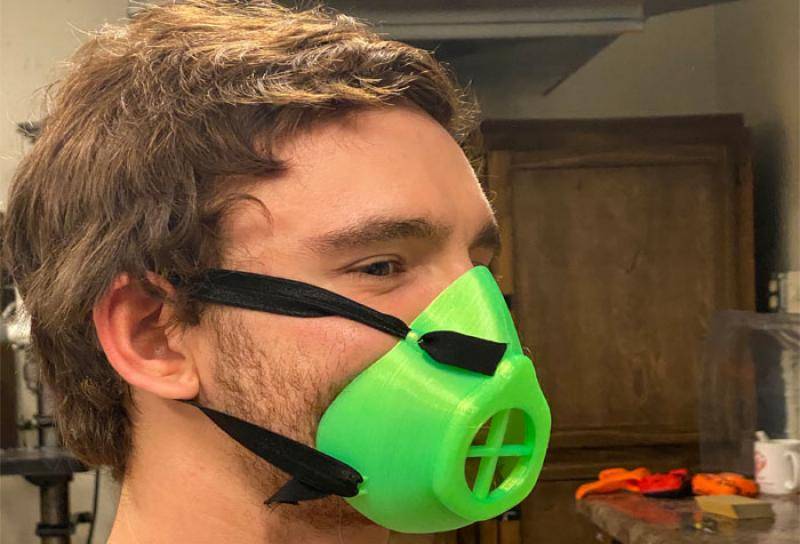Mask wearing while we go out and about in the community has become a way of life here in C-U, and probably will be for awhile as evidence continues to show it’s effectiveness in slowing the spread of COVID-19. Over the past few months, many locals have become mask-creators and distributers, to make sure that whoever needs them can have access to them. Gies College of Business graduate Arielle Rausin and PhD candidate in Kinesiology Joey Peters have teamed up to make masks in a unique way, for a targeted segment of the community: those with spinal cord injuries (SCI).
They initially met through the wheelchair racing team — Rausin as an athlete and Peters, a former U of I gymnast, as assistant coach. Rausin launched her own company, Ingenium Manufacturing, in 2016, to create wheelchair racing gloves using 3D printing technology. Peters is currently a student under Dr. Ian Rice, where he has been involved in SCI research. As COVID-19 took over, they connected with the shared goal of making sure those with spinal cord injuries were protected, and with the help of a $10,000 grant from the Craig H. Neilsen Foundation, they are doing just that.
Rausin shared more about the project.
Smile Politely: What motivated you to pursue this grant and this project?
Arielle Rausin: We were motivated to pursue this grant because we were looking for a way to give back to our community. As an assistant adaptive sport coach and an adaptive athlete, we both know many individuals with spinal cord injuries. When we saw an opportunity to help those people we thought we’d give it a try. I own a 3D printing company and was printing face shields for my family and friends when Joey approached me with the idea to print face masks. It seemed like a great idea and when we learned the NIH had a design that was tested and approved for community use we felt that this was a safe and great product that would really help keep people safe. The grant was provided by the Craig H. Neilsen Foundation. In the past, they were very supportive of students here at Illinois and of our adaptive sports programs, so it was great when we found out they would continue their support by helping keep student-athletes and others with SCI healthy.
SP: Does having a spinal cord injury make someone more vulnerable to complications from COVID?
Rausin: There is no evidence that having a spinal cord injury puts someone at a greater risk of having complications if they contracted COVID, but people with spinal cord injuries have much higher rates of unemployment than non-disabled people so they may have fewer resources to purchase a mask of their own. People with higher level spinal cord injuries have reduced chest and abdominal function which may make it difficult for them to clear airway secretions which could put them at a higher risk of respiratory complications if they contracted COVID.
SP: What makes these masks different, and more suited to someone with a SCI?
Rausin: These masks are tested and approved by the National Institute of Health. They’re the same masks that a non-disabled person would wear. We focused on getting these to individuals with spinal cord injuries and similar disabilities because people with disabilities typically have less access and fewer resources to get the healthcare products they need.
SP: How do you plan to distribute the masks?
Rausin: We are first distributing the masks to people with disabilities living in the Champaign-Urbana area, specifically, students that are registered with Disability Resources and Educational Services (DRES). We are then mailing them to adaptive youth sports organizations around the country that we have partnered with on other projects and through which many athletes at Illinois got their start. From there we plan to send them out to individuals with spinal cord injuries across the state and beyond if we can produce enough.
Photo from College of Aces website.








